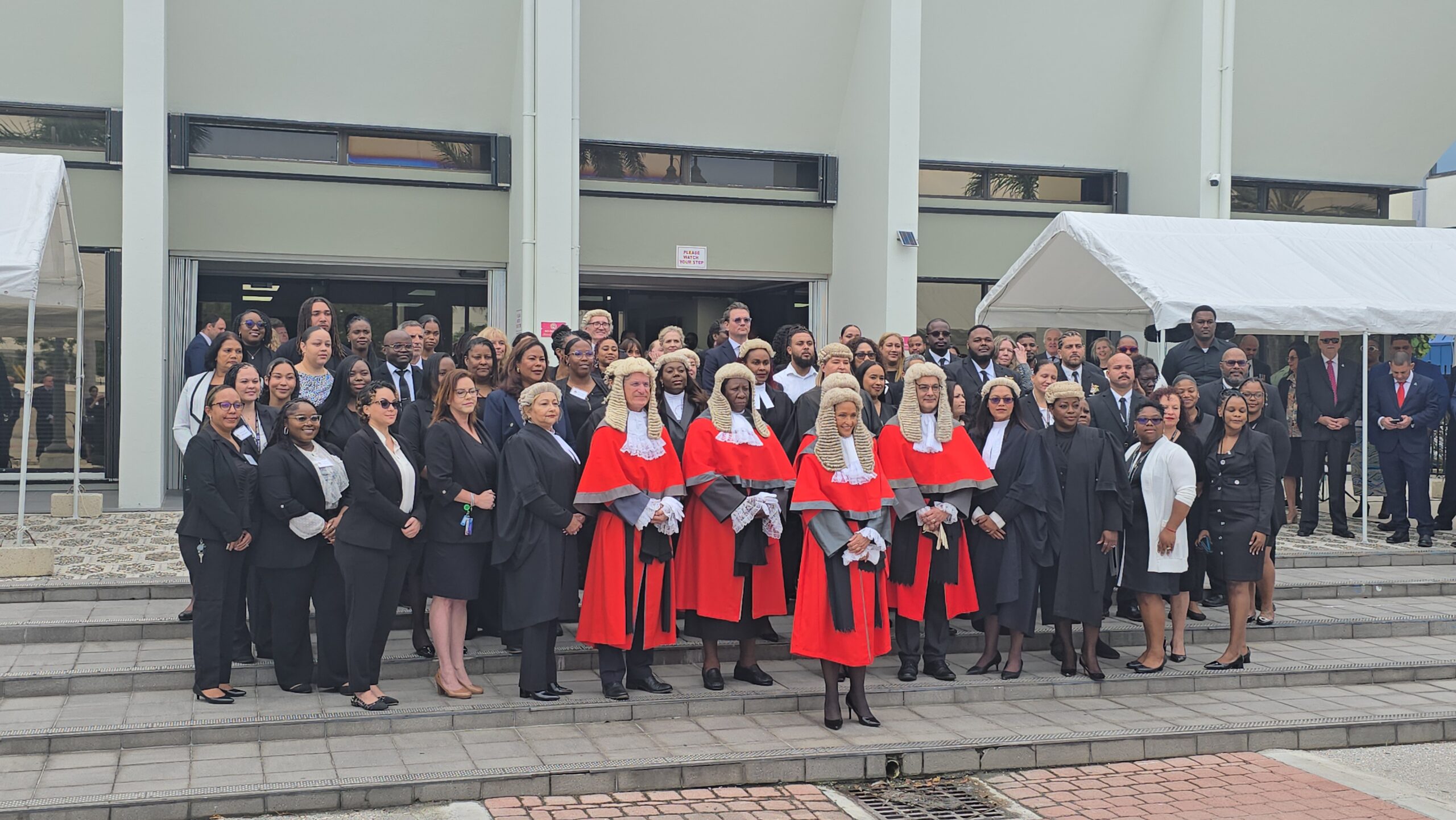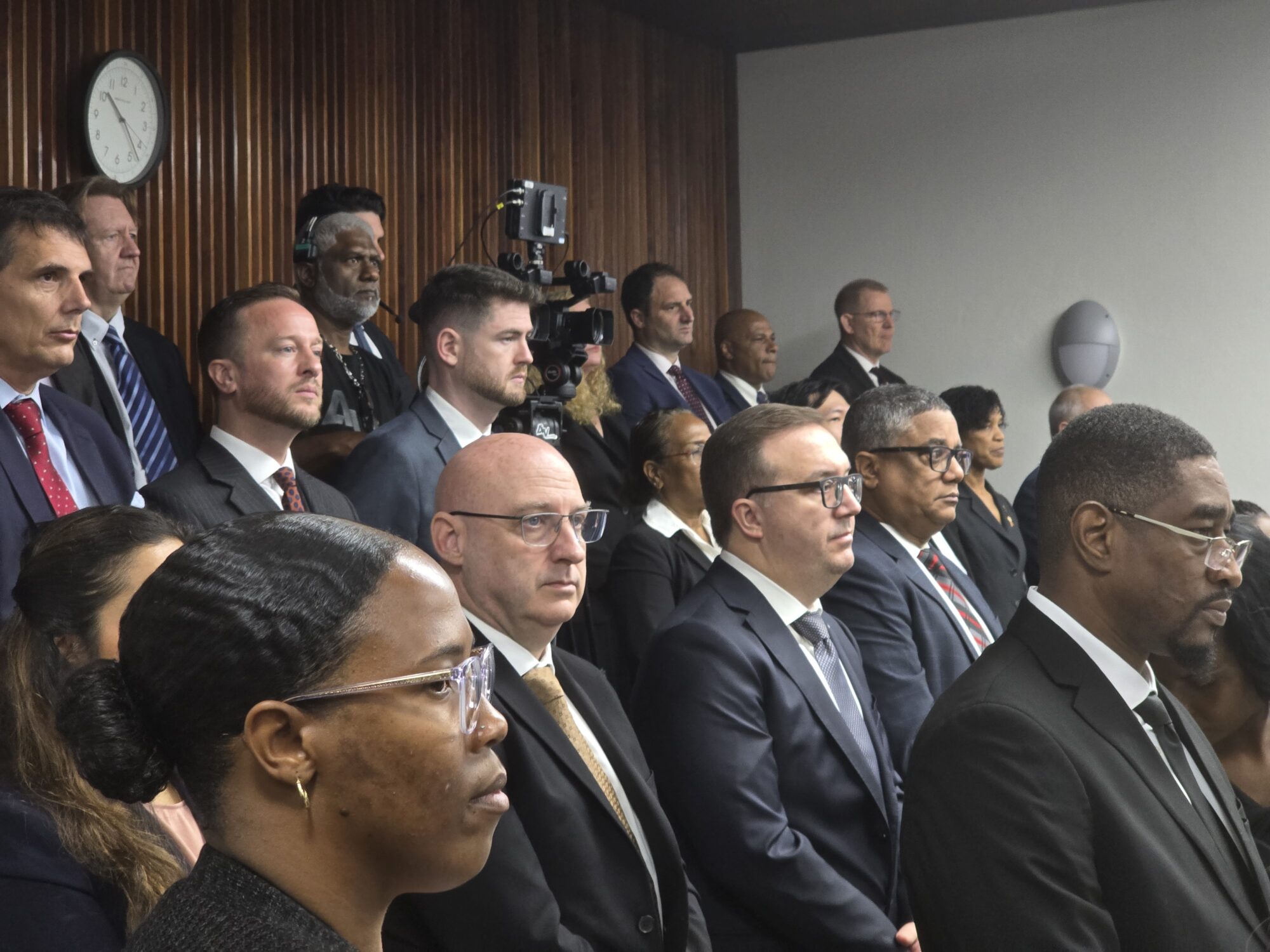
(front: Chief Justice, together with judges and court staff)
|
Getting your Trinity Audio player ready...
|
By Alric Lindsay
At the opening of the Grand Court yesterday, January 8, 2025, the Honourable Chief Justice Margaret Ramsay-Hale highlighted several achievements for the courts of the Cayman Islands. She also noted plans for future improvements to enhance the judiciary’s efficiency further.
Achievements
Easy access to courts for less abled persons
One achievement the Honourable Chief Justice mentioned is increasing access to the courts by members of society who are less abled.
Regarding this, the Honourable Chief Justice highlighted that the facilities available at courts 4, 8 and 9 include elevators. They are also designed for wheelchair access.
Concerning wheelchair access, this is most notable at the law courts building on Cardinal Avenue, where courts 8 and 9 are located. There, members of the public can utilize ramps at the entrance to the court building.
In addition, the court buildings increasingly feature restroom facilities suitable for persons with physical disabilities or who use wheelchairs. This is particularly the case for courts 8 and 9.
Further, the Honourable Chief Justice pointed out that the sidewalks near the courts were redone years ago to allow wheelchair users easier access.
Concerning court appearances by the less abled, the Honourable Chief Justice noted that she presided in a case where a plaintiff was present in a wheelchair in person, and the respondent was present by Zoom from Nicaragua.
Speaking about the lengths the courts will go to provide access to justice, the Honourable Chief Justice said:
It goes without saying… that where a person cannot come to court because the courtroom in which the court is sitting is inaccessible, the court will go to the litigant or defendant.
This has always been our practise.
She added:
We had somebody [who] was hearing impaired in one of our courts last year.
We were given notice that the person had a disability and in response, our IT department provided the litigant with a screen and aim the camera at the speakers so that the person could lip read.
In the circumstances, the judiciary is doing all it can with the resources it has to continue making the courts genuinely accessible.
Cases handled
Regarding the cases successfully dealt with by the courts, the Honourable Chief Justice provided the below breakdowns.
| Division | Number of matters | Observations |
| Criminal | 139 new indictments. | This represented an increase of about 36%, mainly due to 23 new anti-corruption cases |
| Financial Services | 393 new cases | The number of new cases is slightly down from last year’s.414. 202 were applications done by the Clerk of Court for entities to be restored to the company’s register. 191 cases were for the attention of a judge. |
| Family | 299 new cases | 239 cases were disposed of, and of the new cases, 140 were disposed of within the year. There were 233 divorce decrees issued, down from last year’s high of 286. 660 marriages were recorded by the registrar in 2024. |
| Magistrates statistics | Intake of 1213 criminal matters in Grand Cayman. | 1,020 were disposed of, which is a case clearance rate of 84%. |
| The magistrates heard 1,034 new traffic matters. | ||
| The magistrates considered a total of 30 applications under the Domestic Violence Act and Stalking Civil Jurisdiction Act | ||
| Coroner’s Court | 87 new sudden deaths | 49 matters were cleared. Natural causes and misadventures continue to be the majority of recorded verdicts |
Challenges
Notwithstanding the efforts of the judiciary to dispose of all cases presented to it, the Honourable Chief Justice noted that challenges arose in the past with backlogs and ineffective trials. It was also suggested that some laws may require changes to assist the judiciary with managing some issues. Lastly, there appeared to be a query of whether adequate facilities are available to treat persons in cases where mental health issues were involved.
Regarding previous years’ backlogs, it appears that these arose because of natural disasters such as hurricanes or pandemics like COVID-19, which forced the courts to close. These events are outside the judiciary’s control but impact the judiciary’s workload as new cases always surface and need to be dealt with justly and expeditiously.
Speaking of the management of cases, the Honourable Chief Justice shared:
For three and a half months while the RBC trial went on and hurricanes which never happened, there were 69 ineffective trials.
This is of great concern.
In 60% of those cases the trials were ineffective because either the crown or the defence were not ready.
Concerning some instances where the courts are willing to deal with matters efficiently, it appears that the achievement of such efficiency is impacted by the current state of laws or facilities for which the legislature or members of parliament ultimately have responsibility or control.
For example, the Honourable Chief Justice highlighted the magistrates’ concerns for the mental health court.
She said:
In particular, the Chief Magistrate is concerned that there remains a lack of long term direction, as she puts it, as to how we treat the mentally challenged persons who come into conflict with the law, who are best suited for treatment in long term facilities.
The judiciary has no current visibility on what is proposed for these mentally ill persons who find themselves in conflict with the law and who ought not, for good reasons which should be self evident, ought not to be placed within the prison.
But we understand that the [Poinciana] facility will not be made a available for them.
As I said, we have no visibility.
So I don’t know.
The Honourable Chief Justice continued:
… without a long term care solution for these defendants, the prison will be the only place of safety to which a court can remind someone who should actually be treated and not punished outside of court.
Turning to the state of current laws, the Honourable Chief Justice highlighted a proposal that may be made to the legislature to amend the “existing law that would allow the coroner sitting alone to return the verdict in cases of not causes and misadventure or just natural causes.”
The Honourable Chief Justice suggested, “It will be faster, more efficient than having a jury, and that would increase the number of cases disposed by the coroner’s court.”
In addition to legislative changes that could help to enhance efficiencies within the judiciary, it was noted that some challenges could arise with access to justice by persons requiring legal aid to fight their cases. This is because the quantity of such legal aid depends on funding made available through the parliamentary budget approval process.
Explaining the issue, the Honourable Chief Justice said:
There were 329 applications for criminal legal data approved in 2022, 384 applications for criminal legal aid in 2023 and a record 513 applications for legal aid in 2024.
I say this because this has budgetary implications for the persons who sit to my left as we continue to offer legal aid to those persons who cannot afford to represent themselves as an essential in ensuring that everybody has access to justice.
Innovations
Speaking about future changes to the operational side of the judiciary, the Honourable Chief Justice mentioned electronic sign-in features for court guests, which makes the sign-in process paperless now.
In addition, a pilot program was introduced in two courts where transcriber software is used to produce transcripts efficiently for use following court proceedings.
Lastly, the Honourable Chief Justice mentioned that payment kiosks were being installed to assist persons in making payments to the courts.
She shared:
We’ve introduced three payment portal kiosks.
These are self service kiosks that you can use your debit or credit card card to pay your tickets.
They’re installed against the wall and they’re very, very user friendly.
With these changes and the right resources in place, the judiciary will become increasingly efficient, serving the needs of all stakeholders who utilize the courts.

Members of the legal profession in attendance at the Grand Court opening
Note to readers
In the author’s view, the observation which appears to have been made by the Honourable Chief Justice that the amount of legal aid available is subject to the parliamentary budget approval is critical. If funds are delayed or not available because of a parliamentary process, then fewer people may have acccess to legal aid i.e., access to justice.
In addition for the need for adequate access to justice, it is important to respect the independence of the judiciary. This includes financial independence.
As long as the access to justice and finances of the judiciary are subject to parliamentary approval processes, there may be a direct threat to the concept of the rule of law.



